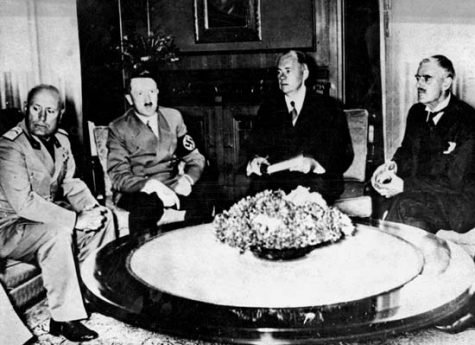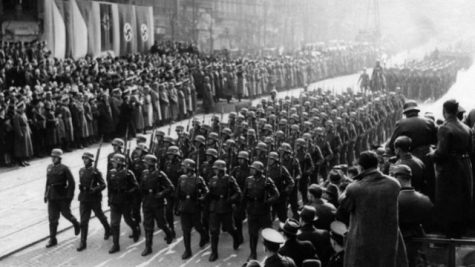This Day in History: September 30, 1938
October 1, 2020

On today’s date, in 1938, the leaders of Nazi Germany, United Kingdom, French Third Republic, and the Kingdom of Italy gathered in Munich, Germany to allow the Nazis to annex the Sudetenland (historical term for north, east, and south Czechoslovakia), in an attempt to appease Hitler’s wants in terms of land. This did not work, however, as Hitler went on to claim more and more land, eventually starting WWII. But why did this happen, and why did no one stop him?
The Reason
In order to know why Hitler annexed the Sudetenland, we have to know what Hitler wanted to do with Czechoslovakia. There were several things in there that Hitler wanted, such as the world’s largest munition site being in Skoda, as well as a technical and physical barrier between Eastern Europe and Russia. Including to this, Hitler believed that all Germans in Europe should be a part of the Reich (Third Reich), and the Sudetenland had alot of them, which was another reason Hitler wanted to take the country. The final reason for Hitler’s absorbtion of Czechoslovakia was his goal of only leaving the “Aryan Race” in the world, or at least Europe. He believed the idea that there was one superior race over all, and that all other races were considered inferior, and sometimes even useless. And with the help of France and Italy, started to conquer multiple countries in Europe to achieve this goal, with Czechoslovakia being the first.
The Signing
On September 24, Hitler ordered Czechoslovakia to hand over the Sudetenland over to Nazi Germany, and gave them the deadline of September 28 to comply. They declined at first, not wanting to give up a large portion of their land, but with the want of a peaceful resolution to the conflict, Britain and France told Czechoslovakia that they would not offer assistance to them. They did make a request to delay the invasion of the Sudetenland to October 1, which was eventually agreed upon, and the final resolution to the conflict was settled on September 30 in Munich.
The Aftermath and Consequences
After the agreement was signed, the leader of the U.K. (Neville Chamberlain) claimed that this was a “peace of our time”, in the now infamous speech. The invasion continued on time, and eventually led to the complete consumption of Czechoslovakia to the Reich. After the invasion commenced, the leader of Czechoslovakia resigned on October 5, knowing that the country had no chance of standing against the Reich. But with how history happened, many people will know that Czechoslovakia was not the last country Nazi Germany would take, despite Hitler saying that it was.
The consumption of Czechoslovakia, as mentioned before, was crucial for Hitler in order to gain access to Eastern Europe, and with what he wanted out of Europe, eventually led him to take Poland, which as we may know started WWII. Many historians nowadays consider the Munich Agreement to be a failure in terms of appeasing Hitler’s needs, even so far as to saying that it accelerated the start of WWII. During WWII, all countries involved with the agreement decided that the terms would no longer be followed after the war eventually ended.


